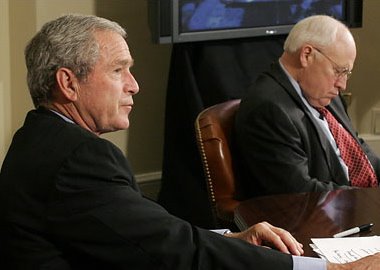We are still waiting for many details surrounding "Leakgate" or "Plamegate", but an answer to my question in the previous post has been provided by Sidney Blumenthal in his article "The Slow-Motion Trap" on Salon.com.
Blumenthal writes,
In the setup for the leak, Fitzgerald writes, Cheney "advised defendant that the President specifically had authorized defendant to disclose certain information in the NIE" and that that approval was a secret. Libby was a team player, but he was also anxious about a declassification that was "unique in his experience."
The formal rules for declassification were amended by Bush's Executive Order 13292 of March 25, 2003, on "Classified National Security Information." Under any circumstances the president has the authority, as he always has, to unilaterally declassify official secrets and intelligence "in the public interest." But a decision to declassify a document normally passes through the originating agency and then through the Office of the National Security Advisor. Then the document is stamped declassified and the declassified order is appended to the document.
None of these procedures was followed in this case, which is why Libby's antenna was gyrating. He sought the advice of Cheney's counsel, David Addington, Libby's close ally. In approaching Addington, Libby must have known what he would hear. Addington is the foremost legal advocate in the White House of the idea that the president should be unbound, unchecked, unfettered in his authority, whether in the torture of detainees, domestic surveillance or any other matter. Unsurprisingly, Addington "opined that presidential authorization to publicly disclose a document amounted to a declassification of the document."
Only four people -- Bush, Cheney, Libby and Addington -- were privy to the declassification. It was kept secret from the director of central intelligence, the secretary of state and the national security advisor, Stephen Hadley, among others. Indeed, Hadley was arguing at the time for declassification of the NIE but was deliberately kept in the dark that it was no longer classified.
So, based on my criteria in the post below, I call that leaking. It's tantamount to spoiling the surprise of the b-day party but not telling any of the guests so that they still hide and yell surprise and the guest of honor has to pretend to be shocked. (Except, of course, it's illegal and unethical, not just poor party hosting.) It's not what they're claiming now, which is that they were responding to calls from the public for clarification on the need to invade Iraq so they declassified some intel (which, BTW, was totally bogus) and gave it to reporters. This is sneaky and smarmy and only a man who thinks that he can get away with anything ("If the President does it, it's not illegal" as someone famously said about Nixon)-- oh, wait, but that's the guy who's our President.
Two other interesting points in Blumenthal's article:
1) He points out eloquently (if not for the first time) the circular logic used in the run-up to the war. I wish I knew how to make a flowchart for this blog. Our intel says ABC, we give ABC to the Europeans, they print it in their papers, we tell it to our people and say, "Look, the Europeans think the same thing!" And in this case, Libby leaks to Miller (in separate conversations) that Saddam "has" WMD, she reports it in the New York Times, and then the Administration says, "Look, even the Times says the same thing! And if that lefty rag the Times is actually agreeing with us, then it must be true!" And frankly, I think there were a lot of us on the Left who trust the Times-- and when we saw them saying the same thing, we bought into it too. I think that might account for a few Senators that voted for the war that now wish they hadn't.
2) He quotes Colin Powell finally, finally speaking out saying, "Indeed, last week, former Secretary of State Colin Powell told journalist Robert Scheer that the notorious 16 words in Bush's 2003 State of the Union address concerning Iraq's supposed efforts to buy uranium -- the claim that former ambassador Joseph Wilson was sent to Niger to investigate -- were bogus. 'That was a big mistake,' Powell said. 'It should never have been in the speech. I didn't need Wilson to tell me that there wasn't a Niger connection. He didn't tell us anything we didn't already know. I never believed it.' ...Powell finally admitted publicly that the president spoke falsely about the reason for war, that there were interested parties inside the administration determined to put false words in his mouth, and that the secretary of state, knowing this, lacked the power to stop it." Now, there is something I thought would never happen. I knew in my heart that he was being railroaded, I just thought his loyalty to these people would make him take his criticism to his grave. Not a coward, just being reserved and dignified.
Powell seems to be on a roll, however, as Salon.com is also reporting that he is yet another retired general who is calling for Rumsfeld's resignation.






No comments:
Post a Comment